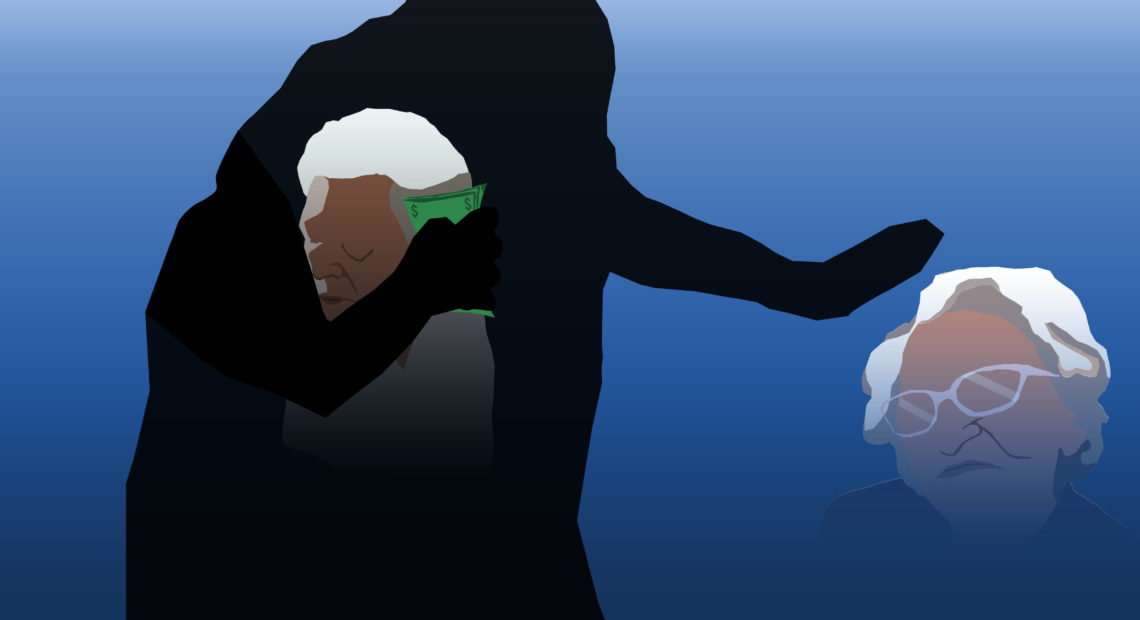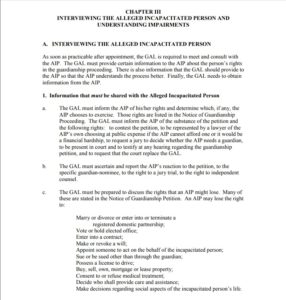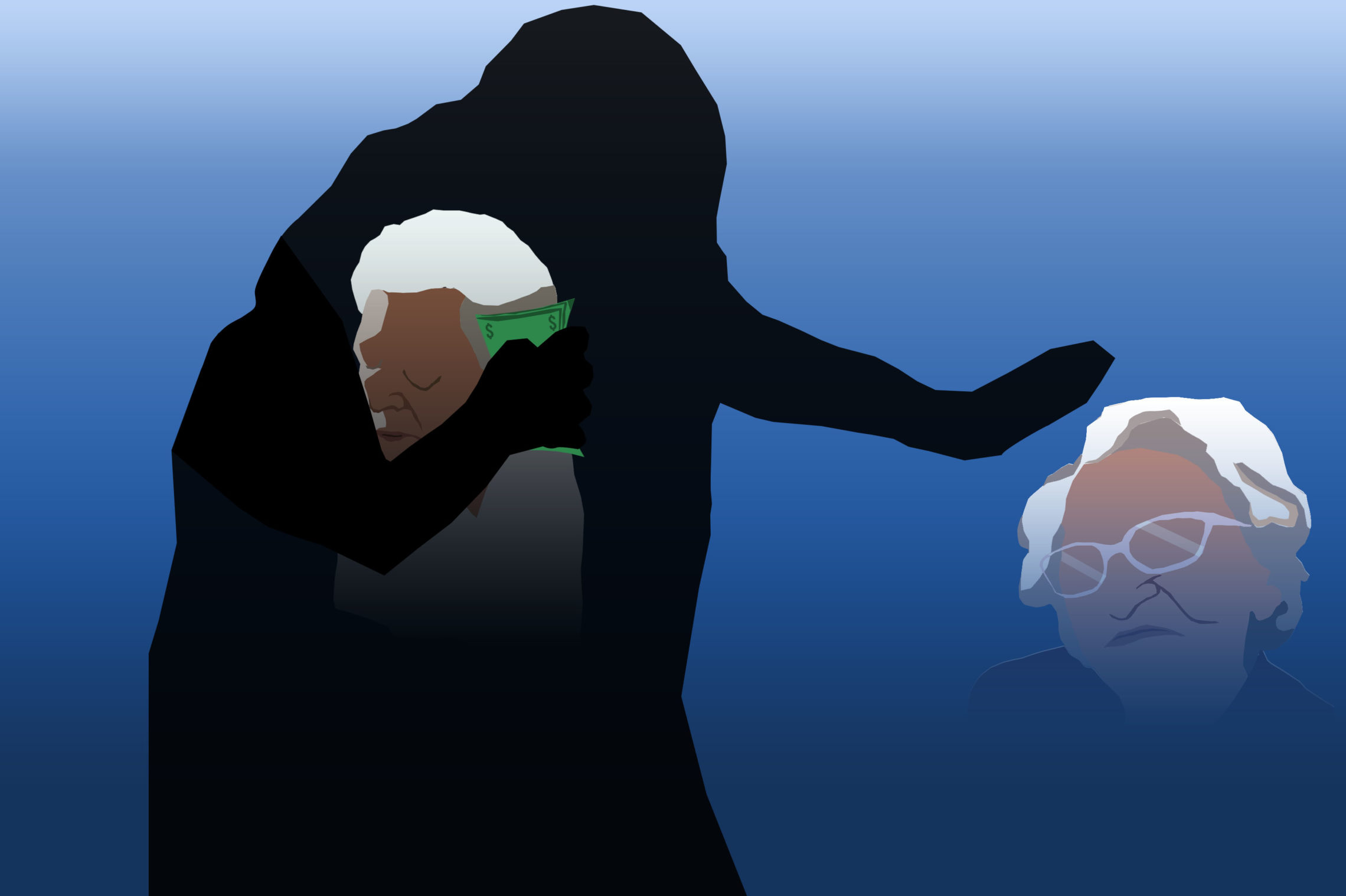
How A Washington Elder Fell Into Guardianship, And How It Can Happen To You
Listen
Originally published Jan. 9, 2018
Catherine Galvin sat in the audience of an elder abuse panel discussion in Richland, Wash., listening to a Q and A about nursing home abuse, predatory behavior and living wills. The panel of professionals answered diligently and offered many resources for the audience.
None of them could help Catherine free her friend from guardianship.
Bonnie ‘Jeanne’ Southall and Catherine Galvin met in 2000 when Catherine, a psychiatric nurse at the Walla Walla Veterans Affairs Hospital, treated Jeanne’s husband, Sam. After Sam’s death Jeanne sought a friendship with Catherine. But at first Catherine was hesitant.
“I was really concerned because even though I was never her therapist I didn’t want the appearance of you know somebody in an unequal situation you know when you’re friends you start from the same basis,” Catherine said.
But when Jeanne heard Catherine needed a place to live she offered to take her in.
“I said I have a big home and a lovely big backyard that’s fenced and you can come to live with me,” Jeanne recalled. “It took her a long time to decide, and (she) came for many interviews. But I guess she decided it was safe living with me.”

Catherine Galvin, left, and Jeanne Southall at lunch together. It would be one of their last visits face to face.
Jeanne Southall is 99. Their age difference was as long as their friendship of nearly 20 years. They had a lot in common, from the places they traveled to the love of good food and doting on their pets.
Was Dementia Diagnosis ‘Reversible’?
Eventually, Jeanne decided to sell her home and move to a senior living facility called Park Plaza, an all-inclusive independent senior living community. Catherine moved just a few blocks away and continued to care for her friend. Losing her eyesight, Jeanne made Catherine her power of attorney to help pay bills and accompanied her to appointments. Shopping, too. Jeanne has a penchant for fashion.
One night in October 2016, Jeanne was taken to the emergency room. Soon after Jeanne moved temporarily to a rehabilitation center.
After recovery, Catherine moved Jeanne back to Park Plaza. But she noticed her friend was acting differently. Jeanne seemed paranoid, anxious and agitated. Catherine made an appointment to see Jeanne’s doctor, Jon Gardner at Providence St. Mary Medical Center. Dr. Gardner diagnosed dementia. Jeanne was 98. But to Catherine, something wasn’t right. The dementia had come on too quickly — speeding through years of dementia onset in a matter of two months. She pored over Jeanne’s medical records and found in the paperwork, “Discontinued medications: Levothyroxine.”
Catherine was elated.
Levothyroxine is a thyroid medication. When a patient is suddenly taken off it, especially a patient who has taken it for years, withdrawal symptoms include agitation, forgetfulness and anxiety. Catherine felt Jeanne’s dementia was reversible. She called Dr. Gardner’s office to inform them.
By the time Jeanne felt herself again, a secret and legal process was filed with the Superior Court of Walla Walla: guardianship.
When you think of the word guardian it may elicit feelings of comfort and care. To Jeanne it brought heartache, financial ambiguity and loss.
Two Types Of Guardians
There are two types of guardians: lay and certified professional. Lay guardians can be family members, friends or a community member. They take an online course and pass criminal background checks before a court will assign them. Lay guardians can care for up to two wards, and the courts oversee them. According to Stacy Johnson at the Office of Guardianship and Elder Service, the state only has an estimate on the number of guardians.
“So, that’s a moving target. I can give you an estimate,” Johnson said. “There’s about 20,000 people under guardian with a lay guardian and about 3,500 with a professional guardian in the state of Washington.”
Losing Civil Rights Under Guardianship
Professional guardians have taken lengthy courses and are certified by the state. Usually they are lawyers. Certified professional guardians can take on as many clients as they want. Both types of guardians have legal authority to make medical and financial decisions.
There are different levels of guardianship. A guardian can oversee estates but not a person’s daily needs, or full guardianship overseeing the entire estate and person. In Washington, alternatives to full guardianship should be pursued first because of the significant loss of civil rights once you’re a ward. That doesn’t always happen. Full guardianship, as in the case of Jeanne, are often the norm despite a person’s capacity to make decisions. Alternatives to full guardianship, such as durable power of attorney, a health care power of attorney or case management, should be considered before full guardianship.
The rights you lose under guardianship: The right to hire a lawyer, make medical decisions, to buy or sell property, to manage your finances, to marry, who you associate with, and to vote.

The guardian ad litem interviews the alleged incapacitated person. In this case, Jeanne says she was not told about the loss of her rights or the option to an attorney. David S. Grossman was appointed by the court as her guardian ad litem. Court documents state he informed her and she declined representation. Link to image document:
https://goo.gl/ntNw4b
It is costly because the incapacitated person’s estate pays for everything from court, lawyer and guardian fees.
When Jeanne was off her thyroid medication, she was incapacitated, meaning she couldn’t make decisions on her own. In legalese, incapacitated has a lower threshold of proof than incompetent. But she had a power of attorney in Catherine who could care for her, and she demonstrated a willingness to do so while Jeanne recovered.
But during this time a social worker, Larry Forseburg, filed a guardianship petition on behalf of Providence St. Mary Medical in Walla Walla stating Jeanne was unable to care for herself, feed, dress and make decisions. He’s also married to the occupational therapist Jeanne was seeing, Sue Foresburg. Yet, while Larry’s petition for guardianship says Jeanne couldn’t care for herself, Sue Foresburg encouraged Jeanne to stay at an independent living facility.
Jeanne had the assistance of another caretaker, Maria Ornelas. Both say they witnessed Catherine and Jeanne arguing to the point that Jeanne would be upset.
Catherine wanted Jeanne to move out of Park Plaza and into a 24-hour care facility, based on recommendations by Dr. Gardner that Jeanne could have a stroke. Jeanne did not want to move. Sue Foresburg and Maria Ornelas told her she didn’t have to if she didn’t want to.
“I had absolutely no say so about this at all. Nobody even asked me or told me about it I had no idea what it was about and I did not know I had to pay for it like I do.” – Jeanne Southall
Jeanne had made friends at Park Plaza, and being seeing-impaired, she was familiar with the layout of the facility. But Catherine insisted and took Jeanne to visit other facilities. Jeanne eventually put down a deposit at Wheatland Village, but soon backed out. This caused tension between the long-time friends.
In court declarations, Sue Foresburg says Jeanne confided in her that Catherine was treating her badly. According to Sue Foresburg, Jeanne asked her to contact her lawyer so she could remove Catherine as her power of attorney.
Barbara Bates, a Clinical Social Worker employed by Providence St. Mary Medical Center, visited Jeanne in March 2017 after guardianship was initiated and reported that Jeanne did not want Catherine as her power of attorney anymore and did not want to move from Park Plaza. Bates also stated that Jeanne wanted her to contact Dr. Gardner and let him know of the situation with Catherine.
The hired caretakers and social workers wrote to the court stating Jeanne was a vulnerable adult and needed protection from Catherine. There were complaints about Catherine to Washington state’s Adult Protective Services that were later dismissed. Despite that, the court issued a vulnerable protection order against Catherine, preventing her from seeing Jeanne.
Catherine admits conversations with Jeanne about moving would get intense, but never abusive.
Jeanne says the same.
Jeanne: “That is not the truth. She never… She might have yelled at me. But are you married?
Reporter: “Yes ma’am.”
Jeanne: “Have you ever yelled at your husband?”
Reporter: “Weekly.”
Jeanne: “I don’t think that is really a bad thing to do sometimes they need it, we’re all human, and what’s the name of the song, Forgive Me, Please Forgive Me, I Didn’t Mean to Make You Cry.”
Catherine says she was trying to follow Dr. Gardner’s advice to move Jeanne to a 24-hour care facility.
“Because I think Providence St. Mary Medical Center is covering up the medical error,” Catherine said. “And they don’t want her to have any standing to bring a suit, and they don’t want me to have any standing to bring a suit.”
Catherine filed a complaint with the Washington Medical Commission against Dr. Gardner. The Commission cleared him.
We were unable to reach Dr. Gardner for this story, but Providence St. Mary Medical Center’s Director of Marketing and Communications, Kathleen Obenland, responded, saying the hospital does initiate guardianship on three or fewer patients a year, often done for patients nearing the end of their lives. Normally, Providence St. Mary Medical Center receives requests from the patient themselves, or family members to initiate guardianship.
“I can’t hear what he’s saying.” – Jeanne Southall during her guardianship hearing.
The Superior Court of Walla Walla assigned David Grossman as guardian ad litem. The guardian ad litem is tasked with investigating whether a person needs guardianship, and at what level. They make recommendations to the court based on interviews. The GAL is supposed to tell potential wards what guardianship entails –that depending on the level of guardianship you lose many civil rights. They’re supposed to ask if the ward wants a lawyer.
Jeanne says no one told her she would lose the right to buy or sell property, marry, hire a lawyer, or vote. She was particularly incensed about voting.
“I had absolutely no say so about this at all,” Jeanne said. “Nobody even asked me or told me about it. I had no idea what it was about, and I did not know I had to pay for it like I do.”
David Grossman filed to speed up the guardianship hearing because a restraining order against Catherine was about to expire. It did, and Catherine and Jeanne saw each other before the guardianship hearing on August 7, 2017.
Read the transcript of Jeanne Southall’s guardianship hearing 8-7-17
According to court transcripts, Jeanne told Judge Scott Wolfram she wanted a lawyer and had trouble hearing what was being said. Judge Wolfram was under the impression that Larry Siegel, Jeanne’s long-time personal attorney, was representing her. He was not. Siegel was there to have Jeanne sign for a different power of attorney to avoid guardianship. Jeanne did not sign. Siegel stated that if Jeanne was contesting the guardianship, he was not an appropriate person to represent her.
Judge Wolfram acknowledged Jeanne could not hear, but accommodations for her were not provided. Thomas Coleman, Legal Director of Spectrum Institute, believes this violates the Americans with Disabilities Act. He wrote to the Washington State Supreme Court on Jeanne’s behalf.
After approving full guardianship, the judge told Jeanne she could hire a lawyer. She could not since she lost that right once the judged signed over guardianship to Omniguardianship, a private company offering guardianship services in central and eastern Washington.
Catherine decided to fight to get Jeanne out of guardianship.
Standing Up
This isn’t the first time Catherine Galvin stood up for those who can’t do it themselves. She blew the whistle on abuse of power and intimidation at the Walla Walla Veterans Affairs Hospital where she was a psychiatric nurse. That had financial and career implications for her. But in 2014 the former administrator at the Walla Walla VA, Sharon Helman, was fired from her upper-level position at the Phoenix VA Health Care System for disguising long wait times for veterans.
That early bout shows Catherine’s personality. She is unafraid to take on a system that she says is holding her friend in near prison.
A Birthday Visit And Charged Her Estate
Once in guardianship, Jeanne’s estate was charged for the guardian ad litem’s fee, the guardian ad litem’s attorneys fees, and Omniguardianship’s fees. That included their attorney’s services, costing Jeanne $17,516.
Guardians, both professional and lay, are paid. The amount? It’s vague. The courts approve of fees based on what they deem fair and reasonable.
Perhaps the headache of dealing with Catherine’s insistence on seeing Jeanne led Omniguardianship to resign as her guardian. We don’t know for sure because the company did not respond to a request for interview.
Financial statements show Omniguardianship charged Jeanne’s estate between $90 – $115 an hour for running errands, talking with Jeanne, answering Catherine’s phone calls, and paying Jeanne’s bills.
Some services were discounted, however, including a visit to Jeanne on her birthday that included a cupcake. A 90-minute visit originally charging $117 discounted to $58.50.
Jeanne, who is blind, says she was never read receipts since being in guardianship.
State law says wards are to be updated on their finances, and guardians are to file periodic financial statements with the court. But Jeanne says she has no idea how much money she has left.
“There is this guardian thing where I don’t know what they do. They’re lovely people. I haven’t had anybody help me who hasn’t been a lovely person,” Jeanne said. “I don’t want to talk about anyone or what they do, because they’re doing their job and they’re needing work and they’re needing a job, and I’m not going to run them down. But I don’t need a full-time guardian, and this is taking the money that (my husband) Sam and I saved for our old age, and we didn’t have a lot of money.”
Documents Sealed
After Omniguardianship resigned, Debbie Conklin of Cornerstone Professional Services took over. Jeanne says she does not know how much Conklin charges an hour. Most of Jeanne’s court documents while under Conklin’s guardianship have been sealed. Guardians generally say it is to protect the privacy of their wards. Critics of guardianship say documents are sealed inappropriately.
In smaller jurisdictions where resources and manpower are limited, clerks do not often have the time to unseal inappropriately sealed documents.
Catherine and Jeanne were allowed by the court to have supervised visits. But those visits depended on Conklin’s schedule. Lunches were cancelled. Weekly supervised phone calls rarely happened, according to Catherine.
Conklin did not want to be interviewed for this story, but did provide a statement saying in part:
“The actions of Catherine Galvin caused this guardianship, a vulnerable adult protection order against Ms. Galvin, supervised visits and ongoing legal action. My careful review of the Court file found no evidence of fraud. The prior guardian engaged in mediation with Ms. Galvin and Ms. Southall which resulted in an agreement to keep the guardianship in place and an evaluation done on Ms. Southall in November 2017. While I cannot disclose medical information, I believe this guardianship is necessary. The drama and expense are unfortunately perpetuated by Catherine Galvin causing unwarranted expense and heartache for Ms. Southall who wholeheartedly deserves peace, joy and privacy.”
Conklin’s lawyer filed and was granted a permanent restraining order against Catherine in October 2018 preventing her from seeing Jeanne.
The long-time friends are no longer allowed to speak to each other.
Getting Out Of Guardianship
You may be wondering a few things. Does Jeanne have other family? Yes. But Jeanne and Catherine asked that the family be left out of this story. You may also wonder how someone gets out of guardianship.
Spokane elder law attorney Cheryl Mitchell literally wrote the book on Washington elder law and practice. She says it is nearly impossible to get out of guardianship.
“When I was in law school one of my professors was talking about living trusts. Living trusts are like lobster traps, easy to get into, difficult to live in and nearly impossible to get out of. I feel guardianships are the same way,” Mitchell said. “You find yourself in a guardianship, and getting out is very difficult. And then the problem is, even if a person wanted to get out of the guardianship, finding an attorney to represent that person is very difficult because the guardian controls the money.”
How does someone avoid entering into guardianship in the first place?
Dr. Sam Sugar is the founder of Americans Against Abusive Probate Guardianship and wrote the book Guardianships and the Elderly: The Perfect Crime. His advice for avoiding unwanted guardianship:
“My number one piece of advice to families is solve your problems, resolve your differences. Never ask a lawyer to solve your family problems,” Sugar said. “If you can’t solve them yourselves, you’re not going to be happy with what a lawyer and judge does for you. I counsel families constantly to figure out a way to make things right between each other, because the moment you wind up in court with lawyers fighting back and forth just about guarantees the family will lose everything, including their loved one.”
Dr. Sugar also suggests having an advance directive indicating how you want to be cared for if or when you cannot make decisions on your own. A video of you saying your advance directive proving your capacity is best. Name a power of attorney and multiple potential guardians.
Not Giving Up
Despite the slim odds, Catherine is not giving up on Jeanne.
“I want her out of the guardianship, and I want to see about getting her an attorney that will get her out of the guardianship,” Catherine said. “And we can get her maybe into a medical malpractice thing to protect her, because they have taken every cent that she has. She has no rights, she doesn’t exist as a person.”
And Jeanne hasn’t forgotten her friend.
“She already knows. I love her,” Jeanne said of Catherine. “I love her like my daughter. And they might take me out of Catherine’s life, but they cannot take Catherine out of my life.”
UPDATE/CLARIFICATION, Jan. 10, 2019:
In the audio of this story, and in a previous web version, several things were misstated that have been corrected in the text above.
First, Jeanne Southall was taken to the emergency room in October 2016, but not for a fall that hurt her ribs. The falling incident took place earlier in 2016. A section discussing her time in the hospital has been shortened so as to not confuse this.
Second, a paragraph describing when social worker Larry Forseburg filed a guardianship petition has been clarified for timeline to show it was not after Jean Southall’s earlier fall.
Third, a section talking about discounted services and a “$45 cupcake” has been clarified to include the full amount Jean Southall’s estate was charged for a 90-minute visit on her birthday. The full visit was discounted from $117 to $58.50, instead of just the cupcake itself being discounted from $90 to $45.
Related Stories:

Why affordable housing providers say they’re facing an ‘existential’ crisis
Affordable housing providers across the Northwest have been contending with rising insurance premiums — and, in some cases, getting kicked off their plans altogether.

Pacific Northwest author’s new novel captures atmosphere of the region
On a gray, early spring morning, I drove to Steilacoom, Washington, to catch the ferry to Anderson Island. I boarded alongside the line of other cars and after parking, stepped out onto the deck of the boat. The ferry pushed off from the dock and rocked a little in the Puget Sound before steadying.
I took this journey to the real Anderson Island to see from the water what inspired Northwest author Kirsten Sundberg Lunstrum’s new novel, “Elita,” which was published earlier this year. Sundberg Lunstrum was inspired while sailing around the Puget Sound to write a mystery novel on an island.
Sundberg Lunstrum read excerpts of the book at a gathering at Tacoma’s Grit City Books.

Repentina suspensión de Head Start afecta a cientos de niños en el centro de Washington
Suspensión de los programas Early Head Start y Head Start afecta a siete Inspire Development Centers en el centro de Washington, dejando a más de 400 niños sin apoyo educativo después de que la financiación federal nunca llegara. También provocó el despido de más de 70 personas.













